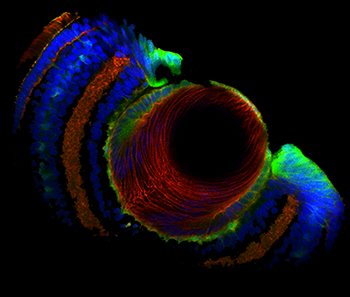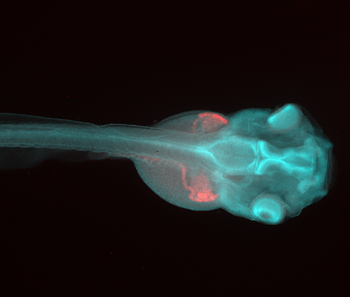Cold Spring Harbor Laboratory Course
Cell & Developmental Biology of Xenopus:
Gene Discovery & Disease
April 7 - 21, 2026
Key Dates:
Application Deadline: January 16, 2026
Arrival: April 7, 2026 by 6 pm EST
Departure: April 21, 2026 around 12 pm EST
CSHL Courses are intensive, running all day and often including evenings and weekends; students are expected to attend all sessions and reside on campus for the duration of the course.
Instructors:
Rachel Miller, UTHealth Houston, McGovern Medical School
Peter Walentek Universitätsklinikum Freiburg, Germany
See the roll of honor - who's taken the course in the past.
https://meetings.cshl.edu/alumni.aspx?course=C-XENO
Follow us on Twitter: @cshlxeno
Check out highlights from the 2024 Xenopus Course!
Xenopus Laevis Eye - Lennart Gollenbeck

HCR Kidneys - Shiri Kult Perry

Xenopus Laevis Whole Tadpole - Christina Roca

In vivo animal models are an important tool for the understanding of human development and disease. Studies using the frog Xenopus have made remarkable contributions to our understanding of fundamental processes such as cell cycle regulation, transcription, translation and many other topics. Xenopus is remarkable for studying development and disease, including birth defects, cancer, and stem cell biology. Because Xenopus are easy to raise, producing many thousands of eggs per day, these frogs have emerged as a premiere model for understanding of human biology from the fundamental building blocks to the whole organism.
Topics for 2026:
Gene manipulation
CRISPR/Cas9 knock-out
Antisense Morpholino knock-down
mRNA and DNA over-expression
Small molecule drug treatment
Transgenesis
Experimental Techniques
Targeted microinjections
Tissue transplantation
Organoid generation
Dissections and ex vivo organ culture
Biomechanics
Single cell technologies
Analysis Methods
Immuno-fluorescence and labeling
mRNA in situ hybridization and hybridization chain reaction (HCR)
Bioinformatics and imaging analysis
High-resolution confocal, spinning-disc and 2-photon microscopy
Time-lapse and live-cell imaging
Plate-based imaging and optical coherence tomography
Xenopus Resources
Genes, genomes, phenotypes: Xenbase
International resource centers: NXR, USA / EXRC, UK / NBRP, Japan
Immunology - U. Rochester
Due to the tailored nature of this course, it is suitable for those new to the Xenopus field, as well as for more advanced students who are interested in emerging technologies. Please feel free to contact the instructors for informal guidance.
Prior Year Invited Speakers:
Lance Davidson, University of Pittsburgh, Pittsburgh, PA
Kerstin Feistel, University of Hohenheim, Stuttgart, Germany
Malcom Fisher, Xenbase, Cincinnati Children's Hospital, Cincinnati, OH
Matt Guille, University of Portsmouth, Portsmouth, United Kingdom*
Marko Horb, Marine Biological Laboratory, Woods Hole, MA*
Douglas Houston, The University of Iowa, Iowa City, IA
Christina James-Zorn, Xenbase, Cincinnati Children's Research Foundation, Cincinnati, OH*
Jennifer Landino, Geisel School of Medicine at Dartmouth, Hanover, NH
Roberto Mayor, University College London, London, United Kingdom
Thomas Naert, Ghent University, , Belgium
Hajime Ogino, Hiroshima University, Higashi-Hiroshima, Japan*
Adam Session, Binghamton University, Vestal, NY
Marta Truchado-Garcia, University of California Berkeley, CA*
Andrea Wills, University of Washington, Seattle, WA
Helen Willsey, University of California San Francisco, San Francisco, CA
John Young, Simmons University, Boston, MA
Coral Zhou, University of Kansas, Lawrence, KS
Axolotl Neurulation - Nayeli Reyes-Nava
https://meetings.cshl.edu/images/videos/xeno1.mp4
SUM memGFP St16 CNC Explant - Lara Busby
https://meetings.cshl.edu/images/videos/xeno2.mp4
Neural Tube Closure - Lorena Agostini Maia
https://meetings.cshl.edu/images/videos/xeno3.mp4
Support & Stipends:
Major support provided by the National Institute of Child Health and Human Development.
http://www.nichd.nih.gov/Pages/index.aspx
Stipends are available to offset tuition costs as follows:
US applicants (National Institute of Child Health and Human Development).
http://www.nichd.nih.gov/Pages/index.aspx
International applicants (Howard Hughes Medical Institute).
Please indicate your eligibility for funding in your stipend request submitted when you apply to the course. Stipend requests do not affect selection decisions made by the instructors.
We would like to acknowledge the following companies that provide invaluable support:
Biolyst Scientific, BioVision Technologies, Bruker, Leica Microsystems, Molecular Devices, Narishige, Nikon Instruments, Sutter Instrument, Thorlabs, Zeiss Microscopy
Bitplane software licenses provided by:
Andor / Imaris
Many thanks to the CSHL Microscopy Shared Resource and its Director Erika Wee for significant contributions to the success of the course.
Cost (including board and lodging): $4,790 USD
No fees are due until you have completed the full application process and are accepted into the course.
Before applying, ensure you have (all due by January 16, 2026):
Personal statement/essay;
Two Letters of recommendation (required);
Curriculum vitae/resume (required);
Financial aid request (optional).
More details.
https://meetings.cshl.edu/information.aspx?course=C-XENO&year=26
Apply for the course.
https://meetings.cshl.edu/coursesapplication.aspx?course=C-XENO&year=26
If you are not ready to fully apply but wish to express interest in applying, receive a reminder two weeks prior to the deadline, and tell us about your financial aid requirements, click below:
Expression of interest.
https://meetings.cshl.edu/coursesintentoapply.aspx?course=C-XENO&year=26
Last Updated: 2025-10-14